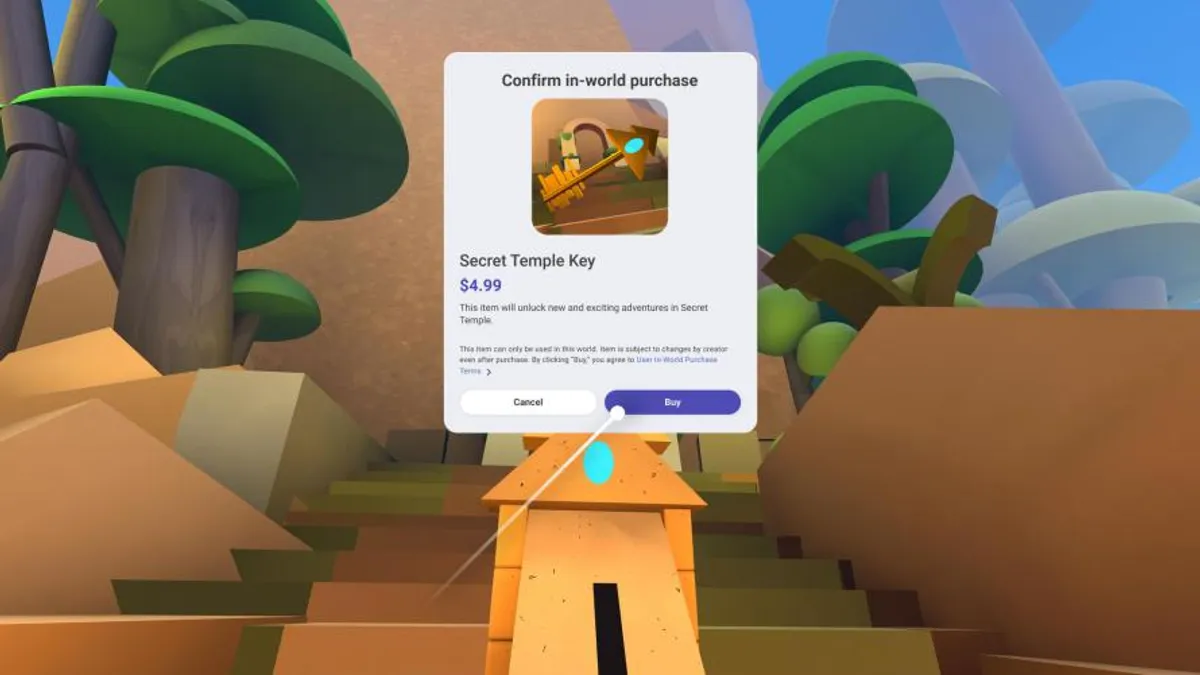Dive Brief:
- Meta, the company previously known as Facebook, is testing new tools for creators to sell virtual goods and experiences in its metaverse platform Horizon Worlds, according to a blog post. Creators will also participate in a bonus program for meeting goals like building worlds that attract the most time spent from users.
- The social media giant will collect a 30% fee from creators that sell digital assets on the Meta Quest Store and an additional 17.5% fee for Horizon Worlds sales, according to a report from CNBC, which confirmed the figures with Meta.
- The initiative comes as Meta figures out how to reposition itself for future growth following a drop in users and after both Google and Apple announced privacy initiatives that will have an impact on its core advertising business.
Dive Insight:
Meta's monetization plans for its core metaverse platform are coming into clearer focus, with an emphasis on steering creators to sell goods through the service. Horizon Worlds has previously set up several monetization options for creators. The first is the Creator Fund, which is meant to provide creators with career flexibility and help them find a sustainable business model. It was launched in October 2021 and initially contained $10 million dollars. Meta said this week that the fund will be expanded.
The next significant program being piloted allows select creators to sell virtual items and effects. This feature allows creators to generate revenue through the sale of virtual items such as fashion accessories. They are currently able to be purchased by users 18 years of age and older.
Lastly, for U.S. participants, Meta has announced a bonus program that rewards creators for hitting certain goals. For now, the monthly goals encompass building worlds that attract the most time spent. However, these goals may be expanded on in the future. Bonuses are paid off at the end of the month and are not subject to fees.
Creators participating in any of the monetization programs agree to follow certain guidelines.
In early February, Meta, fresh off of a rebrand, announced the first decline in Facebook users ever. The less-than-stellar year-end report led to a market value drop of $230 billion, the largest single-day loss for any U.S. company in history.
As Meta looks to regain its footing, it faces challenges from regulatory efforts in the European Union and a renewed emphasis on user privacy in the U.S. However, the 47.5% fee creators will need to pay for the privilege of selling assets in Horizon Worlds is hefty compared to significantly lower fees charged by NFT platforms and even the 30% that Apple charges for sales on its app store, which could hamper the ability of Horizon Worlds to attract creators and, by extension, users.
The metaverse, a fully connected internet where avatars can move between worlds, has yet to be realized. Metaverse platforms, including Meta's own Horizon Worlds, are still very much self-contained. The space faces several challenges including growing hurdles for collecting and sharing consumer data and consumers' lackluster interest, at least so far,. This hasn't stopped a number of marketers from jumping in, including Wendy's, which recently opened a restaurant in Horizon Worlds.















